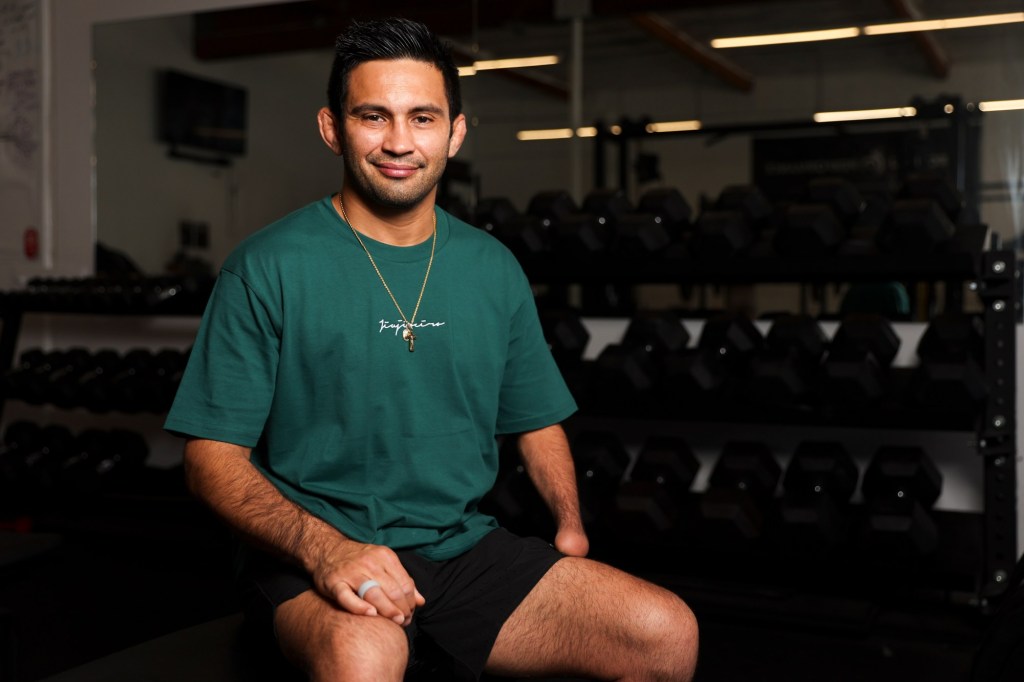Like so many other kids, the moment Geoff Villareal saw those mutated teenage turtles in all of their ninja glory on the big screen, he was imitating what he had seen and drawn to fighting sports. He wrestled in high school, where a friend introduced him to jiu-jitsu.
In the years since, he’s been fighting under the name Geoff Real in jiu-jitsu and mixed martial arts, where his profile on the Smoothcomp tournament website lists him as a black belt with rankings in categories for top men, men advanced overall, and men advanced/master 35-plus.
“There are situations where you can turn something that is a disadvantage into an advantage, and I think you become accustomed to people that have all four limbs and they don’t have any sort of training partner that can mimic exactly what you bring to the table. With that being said, the case of not having a hand should be a massive disadvantage,” Alex Sterner, Villareal’s strength and conditioning coach, says in the short documentary “One Handed Fighter.” “So, I’ve found it incredible how well Geoff is able to not only mitigate that apparent disadvantage, but really thrive despite that. And, he is dangerous. He’s very dangerous.”
The 20-minute film, by San Diego-based Sundoc Studios and being screened at 6:30 p.m. Sunday at Electrum Performance in San Diego, follows Villareal as he becomes the kind of coach he didn’t have. He was born without one of his hands and says there’s no definitive answer as to what caused his birth effect, along with other health issues that include a rare liver disorder and surviving testicular cancer, but he assumes his hand may have been a result of amniotic band syndrome. In the film, there’s footage of him in the MMA ring, teaching jiu-jitsu, training at the gym, playing guitar, and spending time with his wife and their dog.
“I wouldn’t have known I had one hand unless everyone in the world wanted to remind me of it, but it definitely gave me some drive to do well in sports,” he says in the film.Villareal, 37, lives in San Diego’s Azalea Park neighborhood with his wife, Mishaylah Rhodes, and their little dog, Shpadoinkle/Doinks. He took some time to talk about jiu-jitsu, coaching, and fighting for your dreams. (This interview has been edited for length and clarity.)
Q: Can you talk about your process for developing your skills in jiu-jitsu, especially in a way that has enabled you to excel at a professional and competitive level?
A: I have always been drawn to fighting and grappling. I would practice WWE moves on my friends and sometimes get in trouble for it. When I started to do real wrestling, things came naturally. When it came to jiu-jitsu, whether it was in the kimono or not, there were definitely some modifications I had to make. I was determined to get to a high level, so I studied as much information as possible to get me there. I went to different facilities and trained under numerous coaches.
Q: As you first began training, what were some of the challenges you ran into as you dealt with different coaches?
A: I felt like some of them didn’t give me the time of day because I wasn’t going to be the next star, in their eyes. My first jiu-jitsu coach was pretty fair, in the sense that he helped everyone the same way. I had others tell me I had to figure things out on my own. There were a couple who wouldn’t even show up when I would compete, even if they were at the same event at the same exact time I was.
Q: One of your students, Devin, talks about having cerebral palsy and that when they met you, they felt like you were someone they could work with. First, what made you want to become a coach?
A: Becoming a coach was not something I had planned, originally. Since I was always training at the gym and competing often, my coaches, who were owners of the gym, would leave me to cover classes when they were busy with other obligations. I eventually started to coach more often to get more training time in. After a while, I started to coach on a regular basis, both kids and adults, and found that I really enjoyed and appreciated instructing.
Q: What kind of difference do you think it makes for kids with disabilities to have a coach who can relate to some of their experiences in this way?
A: Kids who participate in sports with disabilities can feel singled out or not valued because of their limitations. Having a coach that has overcome adversity and can relate, can help them achieve their own personal goals. I believe it’s encouraging for a student in this situation.
Q: What kind of difference do you think it would have made for you? And, are there ways that you approach your coaching that are informed by what you wish you would have experienced as a jiu jitsu student?
A: I always felt that I was the coach that I never had, at times. I know that as long as I can be consistent and care, along with my experience as a practitioner/competitor, my students will always appreciate that.
Q: What do you hope your story can communicate to others?
A: The message I hope the film can convey is to always chase your goals and dreams. We all have setbacks and failures, and I think the best way to describe this is with a quote: “Failure is a learning experience, and you can either make it a tombstone or a steppingstone.”
